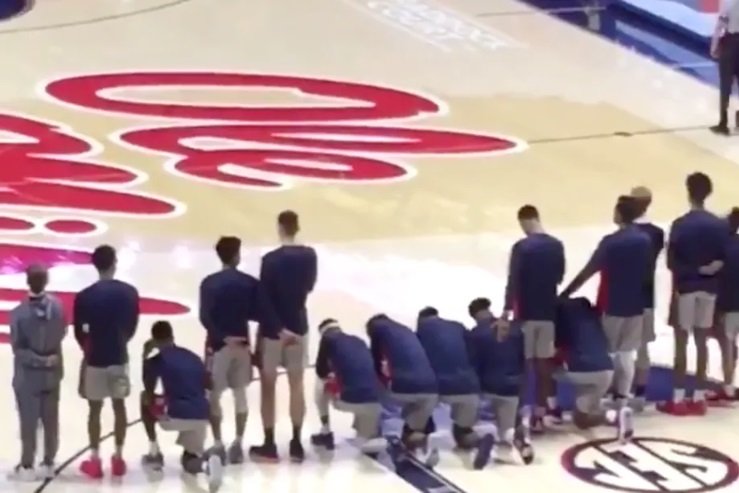Several players with the University of Mississippi basketball team took a knee during the National Anthem before their game yesterday in protest of a Confederate rally being held near the arena.
Initially six players knelt during the start of the “Star Spangled Banner.”
By the end of the anthem, two more of their teammates joined in.
”The majority of it was just that we saw one of our teammates doing it and didn’t want him to be alone,” Ole Miss player Breein Tyree said at a press conference after the game. “We’re just tired of these hate groups coming to our school and portraying our campus like we have these hate groups in our actual school.”
The players’ symbolic gesture — a nod to the NFL protests over racism and police brutality that for several years defined America’s modern culture wars — feeds into a contentious debate on Ole Miss’s campus (not to mention many other schools’) over the legacy of Confederate iconography that is still celebrated and on an display throughout the university grounds.
For months, student groups had tried to force the university to remove the several Confederate monuments currently housed on campus, but still the statues remain in place. In response, roughly 100 protesters, many draped in Confederate garb, marched on campus Saturday to pay tribute to those monuments that honor fallen Confederate soldiers.
PROUD of these men. #HottyToddy #OleMiss #kneel pic.twitter.com/9qI6oaBNJn
— wells taylor (@____wells____) February 23, 2019
It’s a striking move for players to take a knee in Mississippi, where the Confederate legacy is so ingrained in the state’s culture that the stars and bars of the Confederacy remain on the state flag.
The N.C.A.A. and the SEC both refuse to hold championships in the state as a direct result of the imagery on the flag.
And though Ole Miss coach Kermit Davis had said previously that he would not tolerate his players kneeling during the National Anthem, on Saturday he gave them his support.
“This was all about the hate groups that came to our community and tried to spread racism and bigotry in our community,” Davis said. “This created a lot of tension for our campus. I think our players made an emotional decision to show these people they’re not welcome on our campus. And we respect our players’ freedom and ability to choose that.”
The pair of protests on the Ole Miss campus on Saturday represent two threads in the ongoing cultural battle over the legacy of racism and oppression in America: The first is the controversy over National Football League players kneeling during the National Anthem; the second involves the battle over Confederate statues and their symbolism.
Neither started the culture clash — they’re just flash-points in the country’s broad reckoning over racism and violence aimed at communities of color.
In 2016, prominent athletes first began kneeling during the National Anthem in a movement started by Colin Kaepernick. Kaepernick, the quarterback for the San Francisco 49ers, first took a knee after speaking with a former NFL player who had served as a Green Beret and who told him kneeling was both a sign of respect and protest.
It was in the aftermath of several high-profile police shootings, and Kaepernick said he hoped to use his platform to raise awareness about racism and police brutality.
The NFL protests have since simmered down significantly — Kaepernick, who claimed the NFL colluded to blacklist him from playing because of his political protests, has reached a settlement agreement with the league — but conversations about race and slavery’s legacy haven’t.
In recent years, a number of cities and states have been taking a hard look at their Confederate monuments and celebration of figures who fought to maintain white supremacy. (Parts of Ole Miss’s student body are among those groups.)
Some cities and schools have opted to remove these statues from public spaces, to intense backlash.
